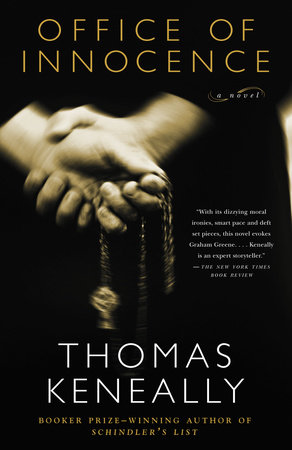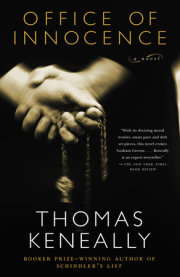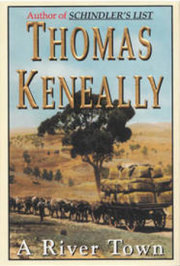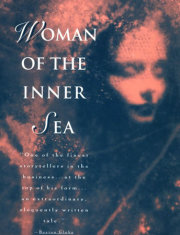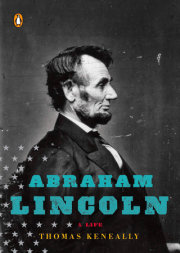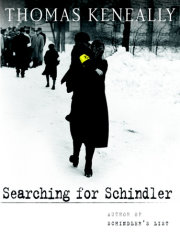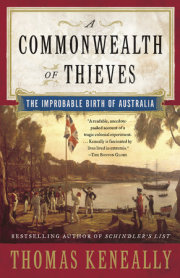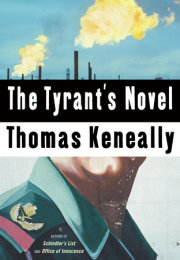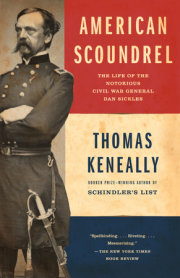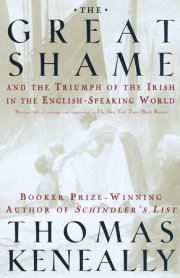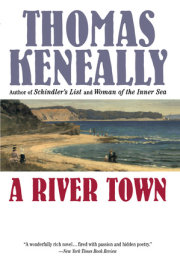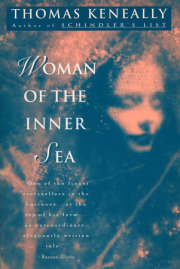I
Penitents, kneeling in the confessional, can be divided into predictable categories. The tennis-playing young priests at White City on Mondays, drinking beer supplied, despite war rationing, by a Knight of the Southern Cross who owned a hotel at Edgecliff, often did so. They spoke only of generalized types of sin and sinner, being careful not to violate the strict seal of the sacrament of penance. So there were, for instance, the self-congratulators, muttering minor sins; the shame-hot boy masturbators; the guilt-obsessed, so hungry for pardon that they would confess, if given a chance, many times a day.
Amongst priests, as amongst the laity, the confessional was a focus of humor, just as, privately, it was a focus of dread and hope. The curates sitting by the tennis courts all agreed that hearing the utterly predictable confessions was an ordeal, and boring. Young priests groaned through their Saturday afternoons, leaving their radios, the staccato of horse races, the reports of Sheffield Shield or rugby league at the Sydney Cricket Ground, to do their personal penance in confessional boxes too hot in summer, too cold in winter. Then a quick meal and their Saturday-evening stints in the box began, with all the banal confessions of disobedience, small theft, secret desire, shifty touches, and self-soiling.
Frank Darragh, a young man of quieter disposition than the other curates, had had an early experience which caused him not to think so cynically, either of the boxes or of those who entered them in piety or desperate guilt. It had occurred on St. Patrick's Day 1939, a few days after Hitler invaded Czechoslovakia. It was, insofar as any day ever was in the seminary, a day of special meals in the refectory, and a day of remission from the Lenten fast which had recently made the seminary bill of fare more frugal than ever. But with an abscessed tooth, he had not been able to do much feasting and was walking down the long driveway towards Darley Road, with a pass from the rector, to go to the dentist. Because he was a pale, lean-faced young man close to being ordained a priest, he would be treated free and for God's love by either of the chatty Cusack brothers, who had a dentistry practice down the hill in Manly.
His naive soul was in some turmoil that day, and it was not to do with missing what passed in the seminary's dour cuisine as a special meal. It was this: should there be a war, he would feel he was being tested to become a volunteer, as his father, Sergeant Darragh, had been in 1915. That which in him made him relish the communal life of the seminary would dispose him, he believed, to enjoy the ordered fraternity of the army. He could tell this from the demeanor of his recently deceased father, who had had a lung condition as a result of both a shrapnel wound and gas intake, but whose eyes had gleamed beneath his freckled dome whenever visitors mentioned the life they had shared in Great War rest camps, after having come alive out of the line. At other times, Darragh's father was politely secretive, yet then uttered unexpected war tales, stories in which Darragh thought absurdity and savagery swamped the humor his father thought to be the real point. From all this, the child Darragh supposed the Great War to have been the most exalting, horrifying, humbling, and valid stage of his father's life. In both darkness and light, it was the measure of who he was. And thus, Darragh's mother said once, there were dead men in France and Flanders who knew his father best, better than she and Frank did. The truth of his father was dug down with the bones of valiant fallen into the soil of unreachable places with names like Bullecourt, Hamel, Albert, Mont St. Quentin.
And now that war asserted itself again, thought Darragh the student, how can I be measured? Within a year he would be a priest. He feared that those who did not understand would consider him an evader of warrior duties, of the duty of being measured. As silly as such a feeling might have seemed to worldlier men, on the way to the dentist it rankled within his innocent chest and ate his virgin heart.
Before he had traversed the long driveway with its deep-green sentries of Norfolk pine, and as he approached the iron gates with their wrought designs of harps, miters, and Celtic crosses, from the archbishop's house on the far side of the road emerged an arduously creeping old priest. He was a familiar sight on the bitumen surface between the archbishop's house and the seminary driveway, and local trucks had been known to steer around him considerately as he stood, contemplatively catatonic, in the midst of the road. It always seemed as if, in walking, the old man was held back by a gravity greater than that of earth. The story was that he had flung incarnate evil, the Devil, out of souls in China when he was a young missionary. Now, in vengeance, the Devil and his minions fiercely delayed the old fellow as he crossed Darley Road on his way to the St. Patrick's Day feast. It had been known for him to take three hours to pass four hundred yards up the driveway, and students who encountered him knew better than to extend a hand to him and thus enroll themselves in the close combat between him and the Evil One. All Darragh, with a dental appointment in the temporal world at two o'clock, said was "Hello, Monsignor, Happy St. Patrick's," to the old man, who was at this time as at most inhabiting another scale of time and place, and passed on.
Darragh accepted that, though many inches taller--indeed, nearly six feet--he was an insignificant figure in the exorcist's landscape. But before he had gone five paces past the barely moving old fellow, he heard a thunderous voice emerge. "Wait!"
Darragh turned and the old man had him fixed with two blazing eyes set in his blocklike Irish head, a skull which seemed to come from another age, from the thirteenth century--reputedly the greatest of centuries, Darragh knew, apart from the diseases people had, of course. The old man's eyes were exactly the sort of eyes which, seconds before or eons ago, had transfixed the Evil One himself.
"You, son!" the old priest further roared. Darragh stopped, and his callow, student soul blazed in his face. He was not ready yet for such an august summons.
"Monsignor?" he pleaded. He could not tell what would be demanded of him, but his pre-dentist nervousness was gone, replaced by a terror more absolute and transcendent.
"You must be a merciful confessor!" It sounded as if the old man had been struck by a message from another sphere, a suggestion that Darragh, unless warned, would not be at all merciful.
Darragh took his black hat off and straightened the black tie he hoped soon to exchange for a clerical collar. "I pray I will be, Monsignor," he assured the old man.
But the exorcist waved his hands in a cut-out-the-claptrap way. "
You must be a merciful confessor!" he insisted.
"Yes," said a terrified Darragh. He knew this answer had no chance of satisfying the terrifying old exorcist. "Help me," he heard himself bleat like a despicable creature, a coward, a sinner, a silly boy as well.
Though the monsignor did not answer, the fury went out of his eyes, and he seemed content that an essential message had been passed. Turning back to apply himself again to the driveway, and advancing by millimeters, he might make the main building by pudding.
This was the most exalted message Darragh had received in all his preparation for the priesthood. As a revelation, it suited him. He'd carried from childhood a sense of the augustness and aura of the sacrament of penance. He was aware of how the penitent, having been absolved, emerged into a new and better light. A trivial Saturday afternoon in a remote place called New South Wales--remote from God's apparent eye, anyhow--was connected to eternity by the exercise of this sacrament so mocked by an unknowing world, so essential to the inner peace of a pilgrim soul.
And, in the summer of '41-'42, now that Darragh had been ordained and was Father Frank Darragh, he was still an enthusiastic confessor, and recognized an extra radiance to the light of day, or on rainy winter afternoons an unexpected warmth about the shadowy penitential pews, as he made his way to his confessional box on the western side of the church. He was thus secretly at a loss at Monday tennis, he did not try to contribute to the ironic classifications of Saturday penitents his confreres came up with. He sat, he smiled, he listened without adding anything. He was well respected by his fellow priests for smiling and holding his tongue. And he was a merciful confessor.
"My aunt says old Frank's got armies of sinners lining up outside his box," said a smiling tennis-champion curate from Hurstville, as if to have armies of sinners was just typical of Frank Darragh.
"Of course he does," said one of the other muscular young priests. "If I'd robbed a bank, I'd want to go to Frank."
"Or if you ran away with a housekeeper?"
"You haven't seen our housekeeper."
Their waspishness had fondness to it. They respected that mixture of secretiveness and warmth of nature that he had inherited from his late father. And the parishioners knew this too. It was not a wonder that the lines outside his confessional occupied perhaps a sixth of the seating in the church. Entering the church with Monsignor Carolan, who manned the confessional on the east side of St. Margaret's, his name above the door--
Monsignor V. J. Carolan, Parish Priest--and Darragh himself, the curate, occupying the hotter box on the western side, Darragh was half embarrassed to see the extent to which the four or five pews of his penitents outnumbered those outside his parish priest's box. He took no glory in it, because that would be the most stupid vanity. And he knew most experienced priests mocked men who attracted too many penitents. It was a sign of some weakness in a priest-confessor, and a characteristic of a particular type of young one. Nor did Monsignor Carolan, his threads of hair sleek across his fine skull, in any way envy Frank. "You'll have to put in for overtime, Frank," Carolan would tell him, all without an edge to his voice.
As a confessor the monsignor appealed to men like himself, grizzled old jokers from Homebush or Strathfield who wanted to be absolved for bread-and-butter sins--taking the Divine Name in vain, making an unseemly joke about an office girl to a companion--all without fuss. Men blessedly unburdened by vaster guilt. Pragmatic, faithful, self-certain fathers of families. Women, too, of similar sunny and practical cast of mind. Monsignor Carolan's finance committee generally went to him to be shriven.
To Darragh, merciful confessor, came many souls troubled by war. Terrible questions had been generated by the time. Men who wanted to know whether, should the Japanese come, they had divine leave to kill their wives and daughters to save them from violation. When Frank conventionally told them that they must trust in the will of God, which cannot be foreseen by humans, he could feel the warmth of doubt begin to rise from them, like condensed water from some scorched surface. He would say, because it was true, "I know I'm a young man, and I do not have your experience. But it seems to me that in these times, when we can predict nothing, the safest road is blind faith. It will give us all more light than any prediction will." He would say also, "You must depend on God to save you from such terrible acts. He understands why you are tempted. But He wants you to be hopeful! It's not as if the Japanese have captured Singapore."
It was not
yet the case, he should have said. These Japanese, who had made so many Jesuit martyrs in the sixteenth century! Could it be believed that in plain old Strathfield, amongst the Federation houses or against the red brick wall of St. Margaret's, they would convert himself and Monsignor Carolan into similar martyrs? His own honest fear as a mere human animal moved frankly in him, and the men who were considering the murder of those nearest to them felt he had taken their impulse off them and onto himself, and were consoled.
To Frank Darragh's confessional too came, these fraught days, a fair number of girls from the bush who had come down to Sydney to work in war factories far from the control imposed by their severe country fathers. They were bewildered, intrigued, delighted, and morally confused by their first kisses and caresses at the hands of more-traveled and opportunistic soldiers and civilians.
As for wives and husbands, the keen chance of Japanese invasion had made people not more wary but more reckless. Darragh knew what was said of priests in these matters--they knew nothing of marriage yet arrogantly traced out the law for lovers and the married. His closest physical contact with a woman had been a blunt and clumsy kiss he had landed on the cheek of a Rose Bay convent girl when he was sixteen. It had heated his blood, but it had not caused him to suffer one of those stupefying erections. And that, apart from the love of his mother and Aunt Madge, was all! Though he would admit without quibble that to advise on matters of marriage and physical desire he needed guidance from the Holy Spirit, he believed it to be superabundantly forthcoming to him in his role as confessor. Sometimes he was surprised by the tenor of the advice which rose unbidden to his lips. To the new race of female riveters, sheet-metal workers, welders, for example, these green and pleasant girls who would have remained under their parents' care but for the war, he might say this: "God has given you in trust the incalculable treasure of your womanhood. Since He has given you free will, you must honor and guard yourself in his place. Remember that one day you will be a grandmother, and your grandchildren will look to what you did when you were young for a model of their own youth." More conventionally he would tell them to turn to the Virgin Mother of Jesus for succor, counsel, and example. The troubles of the war-working girls were nothing to those of soldiers' wives. Sydney suburbs were populated by American soldiers who had arrived well-fed and confident straight from the United States without passing through the filters of war. They had not been humbled by the defeats and hardships of the Philippines. They wore sharp-creased uniforms unstained by battle, yet, as far as fabric could, promising gallantry. They had access to hosiery and chocolate, both of which seemed to mean so much to women, and would kindly bring into the lounge rooms and kitchens of every parish the glossy magazines of American Mammon. What might be most dangerous was that compared to Australian men, the Americans were said to be courtly. Occasionally, after Sunday Mass, one or two of them would present themselves at the sacristy door with a pleasing frankness, courtesy, and respect. One GI had given Darragh a stipend of a pound note and asked him to say Mass for "me and the boys of my section." Darragh told the soldier the normal Mass offering in Australia was five to ten shillings. But the boy--he could have been little more than twenty--said, "No, no, Father. I want you to say a real good Mass." This mixture of innocence and worldliness was of a different order than that of Australians, and that gave the Americans fascination.
Copyright © 2003 by Thomas Keneally. All rights reserved. No part of this excerpt may be reproduced or reprinted without permission in writing from the publisher.

